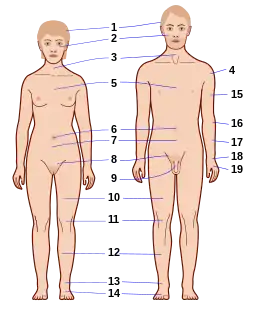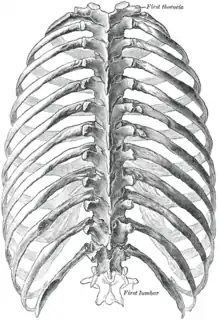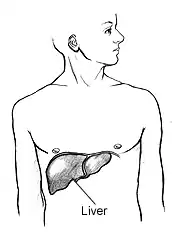chest
English
| Picture dictionary | |||||||
|---|---|---|---|---|---|---|---|
| |||||||
|
Pronunciation
- IPA(key): /t͡ʃɛst/
Audio (US) (file) - Rhymes: -ɛst
Etymology 1
From Middle English cheste, chiste, from Old English ċest, ċist (“chest, casket; coffin; rush basket; box”), from Proto-Germanic *kistō (“chest, box”), from Latin cista (“chest, box”), from Ancient Greek κίστη (kístē, “chest, box, basket, hamper”), from Proto-Indo-European *kisteh₂ (“woven container”). Germanic cognates include Scots kist (“chest, box, trunk, coffer”), West Frisian kiste (“box, chest”), Dutch kist (“box, case, chest, coffin”), German Kiste (“box, crate, case, chest”).
Alternative forms
- chist (obsolete)
Noun
chest (plural chests)
- A box, now usually a large strong box with a secure convex lid.
- The clothes are kept in a chest.
- 1879, R[ichard] J[efferies], chapter 1, in The Amateur Poacher, London: Smith, Elder, & Co., […], OCLC 752825175, page 035:
- But then I had the [massive] flintlock by me for protection. ¶ […] The linen-press and a chest on the top of it formed, however, a very good gun-carriage; and, thus mounted, aim could be taken out of the window at the old mare feeding in the meadow below by the brook, and a 'bead' could be drawn upon Molly, the dairymaid, kissing the fogger behind the hedge, […].
- (obsolete) A coffin.
- The place in which public money is kept; a treasury.
- You can take the money from the chest.
- A chest of drawers.
- (anatomy) The portion of the front of the human body from the base of the neck to the top of the abdomen; the thorax. Also the analogous area in other animals.
- She had a sudden pain in her chest.
- A hit or blow made with one's chest.
- He scored with a chest into the goal.
Derived terms
Translations
|
|
|
|
|
- The translations below need to be checked and inserted above into the appropriate translation tables, removing any numbers. Numbers do not necessarily match those in definitions. See instructions at Wiktionary:Entry layout#Translations.
Verb
chest (third-person singular simple present chests, present participle chesting, simple past and past participle chested)
- To hit with one's chest (front of one's body)
- (transitive) To deposit in a chest.
- (transitive, obsolete) To place in a coffin.
- Bible, Genesis 1. 26
- He dieth and is chested.
- Bible, Genesis 1. 26
Etymology 2
From Middle English chest, cheste, cheeste, cheaste, from Old English ċēast, ċēas (“strife, quarrel, quarrelling, contention, murmuring, sedition, scandal; reproof”). Related to Old Frisian kāse (“strife, contention”), Old Saxon caest (“quarrel, dispute”), Old High German kōsa (“speech, story, account”).
Friulian
Ladin
Alternative forms
- chëst
Middle English
Etymology 1
From Old English ċeast.
Pronunciation
- IPA(key): /tʃɛːst/
- Rhymes: -ɛːst
Noun
chest (plural chestes)
- fighting, strife, battle
- quarrelling, disputation
- c. 1385, William Langland, Piers Plowman, II:
- And þe Erldome of enuye · and wratthe togideres / With þe chastelet of chest · and chateryng oute of resoun.
- c. 1385, William Langland, Piers Plowman, II:
- (rare) turmoil, discord
Descendants
- English: chest
References
- “chēst (n.)” in MED Online, Ann Arbor, Mich.: University of Michigan, 2007, retrieved 2018-04-26.
Etymology 2
From Old French geste.
Etymology 3
From Old English ċest.







